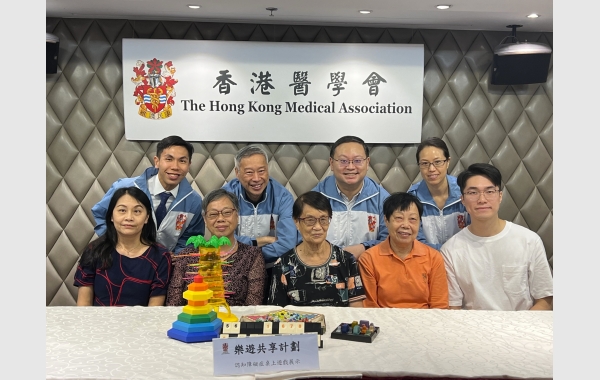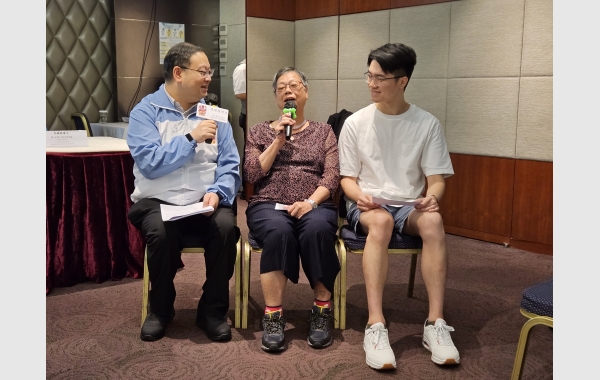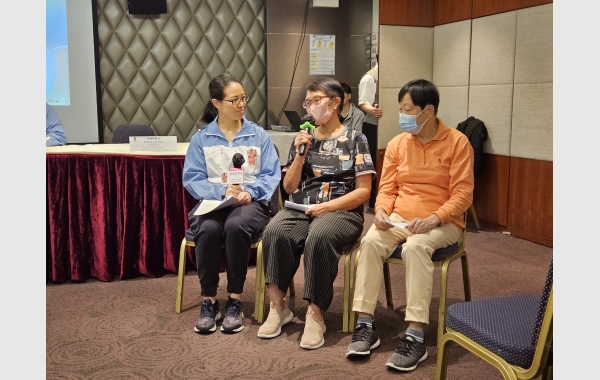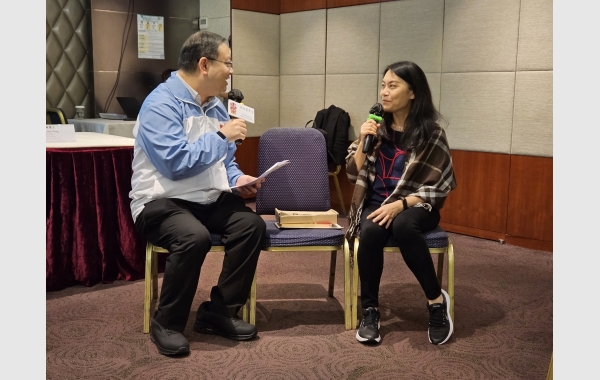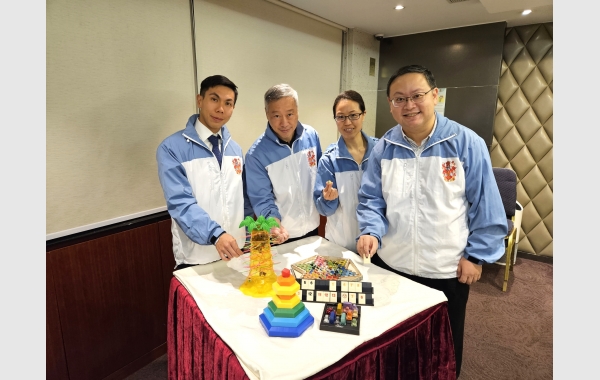香港醫學會
「樂遊共享」- 認知障礙症桌上遊戲訓練先導計劃報告分享會
三年的新冠疫情,市民都遵行社交距離措施,大大減少了面對面的互動機會。對於認知障礙症患者或不良於行的長者,更加無法出外進行其他娛樂活動。香港醫學會(下稱醫學會) 在去年推行新一輪長者健康管理計劃「醫社耆青Level Up」時發現,小西灣區內有不少認知障礙症患者。秉持本會「維護民康」的宗旨,醫學會開始構思「樂遊共享」到戶桌上遊戲訓練先導計劃(下稱「樂遊共享計劃」),希望參加計劃的認知障礙症患者得以抒緩,同時又為照顧者提供資源和簡單可行方法訓練患有認知障礙的家人,減低他們的壓力。
醫學會於今天下午為該先導計劃舉行報告分享會。香港醫學會會長鄭志文醫生在分享會上指出政府正大力推動基層醫療的發展,去年發表的基層醫療藍圖,期望透過不同的政策來紓解人口老化的問題、減低病人的入院率,減輕公營醫療的壓力。醫學會一直關注基層醫療發展,有見長者的精神健康是基層醫療其中一個重要的一環,而本港的認知障礙症的個案正每年遞增,預算在2039年個案人數將達到33萬,照顧者的壓力亦不斷上升。故此,醫學會推出的「樂遊共享計劃」,為政府、市民、照顧者探討低成本、非藥物、有趣而又簡單可行的訓練方案。
「樂遊共享計劃」由醫學會會董兼精神科專科醫生黎榮謙統籌。黎醫生介紹先導計劃於今年六月至九月進行,分別有18位義工(包括5位醫學生、4位職業治療學系學生、5位中學生和4位地區長者)向8位居於小西灣的長者進行訓練。參加者均為認知障礙症患者,由與本會長者健康管理計劃協作的長者服務單位轉介。參與的義工在開始先導計劃前,需先完成訓練課程,學習與認知障礙症患者的溝通技巧、活動評估表的運用和為長者揀選遊戲以及玩遊戲的技巧。義工分成4組固定組別,並以長幼配的組合定期到參加者家中進行訓練。
團隊在正式開展遊戲訓練前,使用《蒙特利爾認知評估香港版》為參加者進行評估,並根據結果,為參加者揀選合適的遊戲種類,制定適切的訓練方案。義工於每節遊戲訓練後需為參加者作評估,評估表由精神科專科醫生制定,針對三大表現(對應認知障礙症的六大病徵):參與性、情緒,和溝通,並細分為九個指標(專注力、眼神接觸、主動透過語言表達、心情、情緒變化、流暢度、內容豐富度、面部表情,和肢體動作)。每次進行遊戲,均由義工進行觀察,然後根據量表作評估紀錄。八節的遊戲訓練在十三星期內,由義工組到戶進行。研究收集的數據分析結果顯示,參加者在參與度、情緒和溝通的三大表現均有改善,分别有22%、16%及35%的增幅。他們的主動性、與其他人的相互關係,和肢體動作亦同時提升,憂慮感也有所減低。
兩位參加「樂遊共享計劃」的義工Juno和美珍向香港醫學會副會長楊協和醫生表示見到參加者經過三個月的訓練均獲得不同程度的進步令他們既驚且喜 - 「驚」的是驚訝簡單的遊戲訓練對參加者的正面影響;「喜」則是因每次到戶和參加者玩遊戲時看到他們面上流露出輕鬆自在的表情。而義工長幼配組合了學生和地區人士,透過互相合作、各司其職,發揮長幼共融。
李小姐是其中一位參加者的女兒,她感謝醫學會推出的「樂遊共享計劃」。作為一位需要看顧患有認知障礙症雙親的照顧者,長期要面對父母因病情反覆而出現的身體和情緒變化,個人的精神壓力有時難以負荷。李小姐表示爸爸以往面對陌生人或到訪的義工時會顯得異常緊張,甚至緊張得「搣手指」。在接受遊戲訓練後,爸爸可能抒發了負面情緒,他變得主動和機靈,自理能力也提升了,搣手指的情況亦大大改善。
在新冠疫情期間,醫學會推行多年的長者健康管理計劃所建立的社交互助網絡發揮了很大作用。醫學會會董李鍵穎醫生與兩位長期參與長者健康管理計劃的「老友記外展大使」心治和彩華也大有同感,兩位均是居住在柴灣的街坊。雖然在疫情期間所有探訪活動需要暫停,地區長者中心都停止開放,但精通廈門話的心治參與了計劃內的「電話關懷隊」,協助團隊連繫和了解只懂說廈門話的探訪戶的需要,讓團隊能為他們提供適當支援。而彩華在疫情期間向團隊反映有獨居的鄰里缺乏抗疫物資,其後與計劃職員到探訪戶門外分派口罩、消毒用品等物資,緩解他們的壓力。
同場亦播放了Clement的錄影片段。Clement是由醫學生成為醫生的資深義工,由讀醫時期已參與計劃的義工訓練和探訪,將自己在課堂上學到的醫學知識與其他義工和探訪的長者分享。現時已畢業成為醫生的Clement再次到戶探訪時發現,部分長者身體狀況已不及從前,但當想起長者由以往隱閉在家不懂尋求幫助,到現在懂得主動反映、聯絡獲取支援,令Clement明白到做義工和定期探訪工作對長者的重要性。
醫學會會長鄭志文醫生在總結時表示今次先導計劃的報告將為下一階段研究定下基礎,並且推動醫學會延續相關服務。鄭會長同時鼓勵更多同類型的研究,更期望政府及團體資助更多同類型計劃,以到戶形式支援認知障礙症長者居家安老和減輕照顧者壓力。此外,鄭會長建議政府和團體推出政策,推動更多年青人和學生參與長者服務計劃,推廣長幼共融。醫學會現正研究發展相關的遊戲資源工具,讓更多有需要的市民和照顧者可以使用。歡迎有興趣為資源套提供贊助的機構聯絡我們,攜手合作,為照顧者打氣,共建認知無障礙的社區。
二零二三年十月十六日
編輯備忘:
香港醫學會成立於一九二零年,旨在聯繫政府、各公立醫療機構、大學及私人執業的醫務工作者,交流意見,團結一心。香港醫學會致力將最新的醫療資訊及醫務發展傳遞與會員,提倡會員遵行專業操守,進而服務社會,維護民康。
傳媒聯絡:
|
查詢 |
: |
葛樂詩女士 |
電話 |
: |
2527 8285 |
|
網址 |
: |
電郵 |
: |
* * * * * * * * * * * * * * * * * * * * * * * * * *
16 October 2023
Report Sharing on the HKMA Boardgame Training
Pilot Programme for Elderly with Dementia
During the three-year COVID-19 pandemic, the public have followed the social distancing policy and could not carry out face-to-face interaction as before. For the elderly people with dementia or physical limitations, it means they cannot join recreational activities outside home setting. Last year, the Hong Kong Medical Association, (HKMA) started another elderly health management project, “Levelling Up COY for Health”, in Siu Sai Wan. It was noted that there was quite a number of the elderly suffered from dementia in the district. Upholding its motto “To safeguard the health of the people”, the HKMA decided to develop a “Boardgame Training Pilot Programme for Elderly with Dementia” (the Pilot Programme) with the aims to improve the conditions of the participants and to provide resources and solutions for caregivers for lessening their burden.
At the Pilot Programme Report Sharing Session held this afternoon, the HKMA President Dr CHENG, Chi Man pointed out that the importance to support elderly with dementia in the community. The Government launched the Primary Healthcare Blueprint last year as one of the steps to address the issues of ageing population and increased tertiary healthcare spending. Mental health of the elderly is actually one of the critical areas in primary healthcare, and the number of elderly with dementia in Hong Kong is progressively increasing. It is predicted that by 2039, there will be more than 330,000 dementia cases among persons aged 60 and above. At the same time, the pressure of the carers is escalating. In light of this, the HKMA carried out the Pilot Programme to explore a training method for the Government, the public and the carers which is economical, non-medication, fun and simple.
The Pilot Programme was led by Dr LAI, Wing Him, the HKMA Council Member cum Specialist in Psychiatry. Dr LAI introduced that the Pilot Programme was carried out between this June and September. Eighteen volunteers, including 5 medical students, 4 occupational therapy students, 5 secondary school students and 4 community (elderly) volunteers, conducted home-based game-playing training for 8 participants in Siu Sai Wan. All participants were elderly with dementia who were referred by the collaborating elderly units. Prior to the game-playing training sessions for the elderly, the volunteers attended training on communication with elderly with dementia, the use of the assessment forms, how to choose suitable boardgames for the elderly and different ways on playing boardgames. The volunteers were divided into 4 fixed groups which involved both young and old as pairs to provide regular home-based game-playing training.
All elderly participants undergone “Montreal Cognitive Assessment Hong Kong version (HK-MoCA)” before the game-playing sessions started. Suitable boardgames and related training targets were chosen for each participant based on his/her MoCA result. Volunteers needed to complete an assessment record for each elderly after each session. The assessment form included 3 key areas (corresponding to the 6 key symptoms of dementia): Participation, Emotion, and Communication. There are 9 indicators under the 3 key areas, i.e. Attention, Eye Contact, Active verbal expression, Feeling, Emotion changes, Fluency, Content richness, Facial expression and Body language. In each game-playing training session, the volunteers carried out observation and recorded the assessment. In the entire programme within the 3 months, about 8 training sessions were performed for the participants. Data collected were analysed and reported through graphic presentation. It showed participants’ improved performances on all the 3 key areas, i.e. participation (22%), emotion (16%), and communication (35%). Observation records indicated that they were more proactive, had enhanced interactions, increased the use of body language, and demonstrated lower anxiety.
Two participating volunteers of the Pilot Programme, Juno and Mei-chun, shared with Dr YEUNG, Hip Wo Victor, the HKMA Vice-President, that they were pleasantly surprised when they saw the improvement made by the participants. They were equally happy to see the sign of relief showed by the participants when playing boardgames. Juno and Mei-chun also considered the combination of young and old in the same volunteer team helped connecting them and enriched their collaboration by sharing different and specific roles.
Ms LEE, daughter of one of the elderly participants, thanked the HKMA in introducing the Pilot Programme. As a carer who needs to spend long hours in taking care of both parents with dementia, any physical and emotional changes of them would add huge burden and stress on Ms LEE. She shared that before joining the Pilot Programme, her father would be stressful in meeting strangers or visitors, sometimes he even picked his fingers. After the game-playing training, her father’s negative emotions seemed being relieved, he became proactive and lively, his self-care ability also enhanced, even his fingers-picking problem was getting improved.
Dr LEE, Kin Wing, the HKMA Council Member and two long-term Outreach Ambassadors for the Elderly, Sum-chi and Choi-wah, strongly agreed that the social support network built by the HKMA elderly health management projects showed its effectiveness and values during the Covid-19 pandemic. The two volunteers are neighbours living in Chai Wan. Although all home visits were suspended and elderly services units were closed during the pandemic, Sum-chi, who is well-versed of Xiamenese, joined our “Call for Care Team”, to connect with those elderly participants who only speak Xiamenese. Sum-chi also helped to reflect needs of the elderly, so that the HKMA Community Service Team can provide appropriate supports to them. Choi-wah, another volunteer, reflected that she had reported to the HKMA that a number of elderly singleton living in her neighbourhood did not have sufficient anti-epidemic supplies. She then paired up with the HKMA staff to distribute materials like masks and disinfect items to lessen their stress.
Clement, another long-term volunteer shared in a video of his voluntary experiences with the HKMA Team since he was a medical student. He shared the medical and health information learnt in school with other volunteers and the elderly he visited. Now that Clement has graduated and is a registered doctor, he still carries on volunteer visits. He is glad to see the positive change of the elderly, from hidden and passive in the past to now proactive in seeking assistance when in need. Clement’s volunteering experience demonstrates how vital regular home visit is for elderly with dementia.
Dr CHENG, Chi Man, the HKMA President expressed that the HKMA would further explore the training and other related projects based on the results of the Pilot Programme. The HKMA calls for subsidy from the Government and other organisations for similar programmes to support the elderly with dementia and to relieve the burden of their carers. Besides, the HKMA suggests the Government and other organisations to implement policies to facilitate more youngsters in participating in elderly services programmes, leading to the integration of the young and old in the community. The HKMA is planning to develop a game-playing resources tool, so that more people and carers can use it, and we welcome collaboration with organisations that are interested in providing sponsorship for the tool development.
Let us join hands to lessen the carers’ pressure for the building of a dementia-friendly community!
Notes to editors:
The Hong Kong Medical Association (HKMA), founded in 1920, aims to bring together Hong Kong's government, institutional, university and private medical practitioners for an effective exchange of views and co-ordination of efforts. The foremost objective of the HKMA is to safeguard and promote public health. The HKMA speaks collectively for its members and aims to keep its members abreast of medical ethics, issues and advances around the world. In fulfilling these goals, the HKMA hopes to better serve the people of Hong Kong.
Media Contact:
|
Enquiries |
: |
Irene GOT |
Tel |
: |
2527 8285 |
|
Home Page |
: |
|
: |


